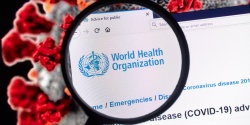Published: 01.04.2022

· The World Health Organization is preparing a document known as the "international anti-pandemic treaty".
· The declared goal of the act is to improve global health security.
Under the terms of the treaty, the World Health Organization would act as a coordinating body for global health issues. This would mean that Poland would give up some of its competences to WHO.
· Pursuant to the Constitution, the transfer of the powers of state authorities by the Republic of Poland is possible only under a nationwide referendum or in an act passed under certain conditions.
· The Ordo Iuris Institute has prepared a study on the subject.
The appearance of the SARS-CoV-2 virus led to the declaration of a global pandemic by the WHO. This resulted in an unprecedented process of transferring responsibility for decisions related to the protection of public health from the national level to the international level. At the end of 2021, the WHO announced that it would start working on a document that "would allow countries around the world to strengthen national, regional and global capabilities and resilience to future pandemics." The emergence of the announced document may raise concerns as to whether, as a consequence, the powers of the state authorities will not be transferred to an international organization.
The "International Anti-Pandemic Treaty" is currently in the editing phase. It is not known exactly what changes he would introduce. Only its main goals and assumptions are presented. However, it is possible to include provisions in the document under which WHO would take over some of the competences of state authorities.
The first negotiating meeting on the treaty was held in February this year. According to the information provided on the website of the European Council, the document would introduce "a stronger international health framework in which the WHO would act as a coordinating body for global health issues". Moreover, there is a possibility that the possible, extended competences of WHO will concern not only the fight against infectious diseases, but also issues related to climate change and abortion. This is evidenced by, inter alia, statement issued by G7 leaders following their February 2021 meeting to tackle the coronavirus pandemic. However, the statement also included postulates relating to climate change or the implementation of the so-called Sustainable Development Goals.
The Constitution of the Republic of Poland, which is the highest act of universally binding law in Poland, allows for the delegation of some powers of state authorities to an international organization. However, specific conditions specified in the constitution must be met. Article 90 of the Constitution of the Republic of Poland stipulates that the conferral of the powers of state authorities by the Republic of Poland must be preceded by consent expressed in a national referendum or in an act supported by a majority of at least two-thirds of votes in the presence of at least half of the statutory number of deputies and a majority of at least two-thirds of votes in the presence of at least half of the votes of the statutory number of senators.

09.04.2025
• On April 8, the Ordo Iuris Institute presented the Polish version of a document with proposals for reforming the European Union, prepared jointly with Hungary’s Mathias Corvinus Collegium (MCC).

08.04.2025
Sixth Court Hearing Ends Without Progress

07.04.2025
In response to the liberal left’s self-proclaimed “militant democracy” in Poland and

04.04.2025
• Over 30,000 signatures were submitted by the Ordo Iuris Institute and the Center for Life and Family urging President Duda to veto the “hate speech” law passed by the Polish parliament on March 26.